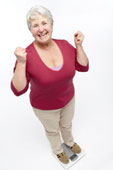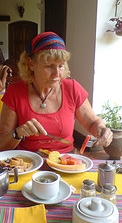Anti-Aging Diet

Between the ages 4- and 65, life becomes more sedentary for many of us. We may retire and have fewer personal obligations than before. A slower lifestyle means that the body needs fewer calories. Yet our vitamin and mineral requirements remain the same or increase in order to prevent cell aging and dietary deficiencies.
Healthy Eating Patterns: Since diet is so important as you grow older, it is advisable to periodically alter your diet and eating patterns. Do you eat with health in mind or are your eating habits based on convenience? Are you prone to eating lots of “empty calories” in the form of fatty and sugary foods? Are you at risk of diet related health problems such as osteoporosis (a chronic disease that weakens the bones)? Nutritionists recommend a low-fat diet based on fresh fruit and vegetables, unrefined, complex carbohydrates and protein foods such as oily fish. This keeps the immune system in good working order and helps prevent cell aging and degenerative diseases caused by free radicals (highly reactive molecules within our bodies). The World Cancer Research Fund estimates that 40 per cent of cancers (approximately 4 million cases worldwide) can be avoided by following a healthy diet and not smoking.

Do You Need To Lose Weight:
Excessive weight gain is not inevitable as we age. In fact we should not weigh more than 9kg/20lbs more at the age of 50 than we did at the age of 20, regardless of height. Many weight charts are standardized to include age, height and sex; if your weight is 20 per cent above or below the standard, it is advisable to have a medical check up to ensure no problems exist. In 1999, Dr. Margaret Ashwell, a nutritionist, recommended a new simple method of determining acceptable weight to the British Royal Society of Medicine. According to her method, if you waist measurement is less than half your height measurement, then your weight does not present a health hazard. If this method is applied to the people in the UK, 15 per cent of men and 11 per cent women can be considered dangerously overweight. Another way of assessing weight is to calculate what percentage of your body consists of fat. This is a test that can be performed by some health centers and sports clinics. On average our bodies are composed of approximately 63 per cent water, 22 per cent protein, 13 per cent fat and 2 per cent vitamins and minerals. If your fat ratio is significantly higher than 13 per cent a doctor is likely to advise you to reduce your fat intake and increase the amount of aerobic exercises you do. These are important measures in the prevention of chronic health problems. As you get older it is advisable to avoid foods that contain too many additives such as sugar and salt, which are implicated in health problems such as hypertension and diabetes.

As part of your dietary reassessment, study the labels of the foods in your kitchen. Compare the additives and ingredients in different foods. Ideally, the food on your shelves should be low in calories, saturated fat, sodium and sugar, and high in fiber and vitamins and minerals. If you become familiar with the composition of different foods, you will quickly become adept at monitoring what you are eating.